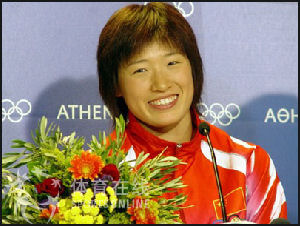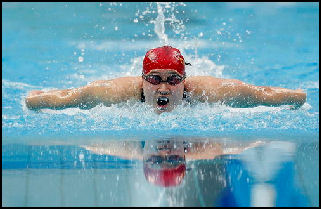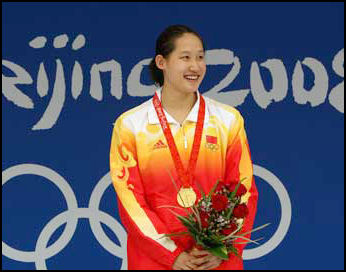OLYMPIC SWIMMING IN CHINA

Luo Xuejuan China placed 10th in medals in swimming at the Summer Olympics in Athens in 2004, winning two medals, one gold and one silver. Luo Xuejuan won a gold medal in the women’s 100 meter breaststroke; the Chinese team won a silver medal in the women’s 4-x-200 meter freestyle relay. Luo, who has won three gold medals at the World Championship in 2003 in Barcelona, said, “I picture myself as a wild beast about to pounce on its prey. The prey, of course, is the gold medal.”
China didn’t win any golds at the 2005 or 2007 swimming world championships. It won just one gold at the Beijing Olympics in 2008. At the 2009 world’s in Rome, the team won 10 medals, including four golds.
Mao's favorite recreational activity was swimming. As a young man he promoted the health benefits of swimming, wrote his earliest poems about it and reportedly had his first political discussions with his school chums next his favorite swimming hole. Mao believed that swimming was a struggle between man and nature. He liked swimming in stormy seas and had pool built at his compound of which he was the only user.
Mao once proclaimed he was going to swim China's three great rivers — the Pearl, the Yangtze and the Xiang. When he leapt into the Pearl River in Guangzhou 20 or 30 guards jumped in after him in their underwear. "Just as I feared the water was filthy," Mao's doctor Dr. Li Zhisui wrote. "I saw occasional globs of human waste float by. But Mao was not bothered. He floated on his back, his big belly sticking up like a balloon, legs relaxed, as though he were resting on a sofa...We floated down the Pearl River for two hours or so, covering 6 or 7 miles. Mao was elated as if he just won a war." [Source: "The Private Life of Chairman Mao" by Dr. Li Zhisui, excerpts reprinted U.S. News and World Report, October 10, 1994]
Mao he encouraged other party members swim. Chinese leaders Deng Xiaoping and Jiang Zemin took widely publicized swims. See Deng, Jiang
A set of identical twins — Jiang Tingting and Jiang Wenwen — won the gold medal in synchronized swimming at the Asian Games in 2006.
Japanese Synchronized swimming coach Masayo Imuru, left the Japanese team to coach the Chinese team, a move regarded as an act of treason by some Japanese. See Japan, Sports.
World Swimming Championships in Shanghai
Shanghai hosted the world swimming and diving championships in July 2011. The opening ceremony featured dragon boats in the pool and singers leaping in the water during midong under a spectacle of lights. China swept all the diving events — with some divers such as Qin Kai and Luo Yutong in the men’s three-meter synchronized event winning perfect 10s from the judges — at the world swimming and diving championships in Shanghai in July 2011. China also did reasonably well in the swimming, picking up a few medals. It took a silver in syncronized swimming. Wu Peng took the bronze in the men’s 200 butterfly behind multiple-Olympic-gold-medalist Michael Phelps and a Japanese swimmer. He had beat Phelps two times earlier in the year.
Sun Yang capped the the world swimming and diving championships in 2011 with a gold medal and world record in the 1,500-meter freestyle, breaking a record set by Australian Grant that had stood for 10 years. AP reported: “Sun was more than two seconds off Hackett’s pace with four laps to go in the marathon in the pool, but ignored fatigue and accelerated on the final two laps to finish in 14 minutes, 34.14 seconds, improving on Hackett’s mark of 14:34.56 set at the 2001 worlds.
“I was not obsessed with the world record before the final, because I wanted to focus on my plan,” Sun said. “My goal is to win the gold.” After the race, Sun was congratulated on weibo — China’s version of Twitter — by Liu Xiang, the 2004 Olympic gold medalist, a former world record holder in the 110-meter hurdles and a sports hero in China. “I think Liu Xiang created history in 2004. I watched the games on TV and after he won the gold medal, I was very excited. I thought someday, I will be like him,” Sun said.
The crowd at the Oriental Sports Center provided loud support over the final laps, erupting into more joy when the clock stopped four-tenths of a second inside Hackett’s mark. Fifth-place finisher Chad La Tourette of the United States said he was “just happy to be a part of it.” “I knew he was going to be close at the 800,” La Tourette said. “That was a fantastic swim and it really just kind of sets himself apart as a once-in-a-generation type swimmer like Grant was.”
It was only the second world record to fall in swimming since high-tech bodysuits were banned 19 months ago — and Hackett’s record had been the only mark to withstand the record deluge during the polyurethane era of 2008 and 2009. American all-around star Ryan Lochte set the first world record since the return to textile suits at this meet Tuesday in the 200 individual medley. The two world records set in this eight-day meet were a sharp contrast from the 43 marks that dropped at the last worlds in Rome two years ago.
The 19-year-old Sun also won the 800 free earlier in the meet, plus a silver in the 400 and a bronze with China’s 4x200 relay squad. He is coached by Hackett’s former mentor, Dennis Cotterell. Upon breaking Hackett’s mark, an exhausted Sun celebrated mildly, then bowed to the crowd. Later, nearly all the fans in attendance sang along to the Chinese anthem. “I still think I have things to improve, especially my mental state,” Sun said. “After winning the gold medal, I think more and more people will pay more attention to me. There’s no doubt I will feel more pressure but I’m still young and I don’t want to be burdened by gigantic pressures. So next year, I will keep a relaxed mindset so I can handle future races.”

Poster commemorating Mao's Yangtze River swim
Hot Water Mars the Open Water Swim at the World Swimming Championships
The only real black marks at the event were the open water swims which was held an hour from Shanghai in hot 30 degree C waters off Jinshan City. AP reported: “Unsafe water temperatures created chaos in the 25-kilometer races at the open water world championships Saturday, forcing most of the American team to withdraw and one swimmer to accuse organizers of acting irresponsibly for allowing the events to be held. [Source: Justin Bergman, Associated Press, July 23, 2011]
The men's and women's races were moved up two hours to a 6 a.m. start in an attempt to stage them in cooler conditions, but the water was already 87 degrees — just under the suggested "unsafe" point of 88 degrees. As the morning wore on, the water temperature reached 88 degrees and the sun began beating down on the course. The air temperature reached 90 with 68 percent humidity by the time the race finished.
Italy's Edoardo Stochino was pulled from the water 4 hours, 50 minutes into the race and taken away on a stretcher as officials poured cold water over his chest. Germany's Thomas Lurz and American Alex Meyer didn't start the race and defending champion Valerio Cleri of Italy withdrew after four hours, saying it was "too hot and too dangerous" to continue. "There's not enough attention on the athletes," Cleri said. "There should not have been a race here. The jury was irresponsible."
Of the 35 men entered in the race, only 19 finished, with 10 pulling out before the finish. Six decided not to start. Bulgaria's Peter Stoychev won the men's race in 5:10:39.8. Only four of the 21 women who started the race withdrew midway through. Two did not start, including Linsy Heister of the Netherlands, the champion in the 25K at the open water world championships last year. The women's race had a sprint finish, with Brazil's Ana Marcela Cunha beating Germany's Angela Maurer by a body length. Cunha finished in 5:29.22.9.
Dennis Miller, FINA's liaison official for open water swimming, defended the decision not to halt the race when the water temperature reached 31 degrees, saying the lead packs of men and women swimmers were looking strong and necessary precautions were being taken, such as having two doctors and multiple boats on the course. "Thirty-one degrees is a guideline, it's not a rule," he said. "We have to take into account how the swimmers are actually looking in the water, how the coaches are feeding the swimmers. It is really the coach's responsibility, their duty to care for their athletes.
Chinese Women's Swimmers
During the 1994 World Swimming Championships, the second most important swimming competition after the Olympics, in Rome Chinese female swimmers stunned the world by taking 12 out of 16 gold medals while Chinese male swimmers didn't make it the final in a single event. Not only were the women fast they were unbelievable young: the oldest was only 19.
The women's team was expected to win as many as eight gold medals at the 1996 Olympics in Atlanta. Instead the only won a single golden medal (in the 100 meter freestyle) and five silvers and bronzes.
Chinese Women's Swimmers and Drugs at the 1994 Asian Games
At the 1994 Asian Games in Hiroshima Japan, Chinese women again took most of the medals in the women's swimming events and set several world records. But after the competition, 11 Chinese athletes tested positive for drugs, including seven top Chinese swimmers (three women and four men). Among them were Lu Bin, who won four gold and two silver medals at the Asian games, and world champion swimmer Yang Aihua, who was banned from swimming for two years. In all, China was stripped of 22 medals. [Source: Washington Post]
It is believed that the Chinese women swimmers took steroids and used masking agents to prevent the drugs from being detected in drug tests. The success of the Chinese was reminiscent of that of the East German women swimmers, who came out of nowhere to dominate swimming in the 1970s and 80s and later confessed to taking steroids. As was true with the East German swimmers, nearly all the good Chinese swimmers were women (male swimmers presumably get less of a boost from anabolic steroids) and they had deep voices, masculine physiques and sometimes missed competitions for unexplained reasons. Some of the coaches and trainers in China came from East Germany.
After the swimmers were nabbed one of the Chinese coaches said: "In three of the four drug cases [in which Chinese swimmers were caught], we were the ones who administered the tests and reported the results. We are against doping. We are for penalties against doping." When asked about doping Le Jingyi, world record holder and winner of five gold medals in Rome, said: "I would like to attribute our success to the brilliant coaches we have as well as to the hard work we do. I am very angry about the accusations of doping. I think the main reason is that some people are jealous."
After the drug tests were revealed pictures of the disgraced swimmers were posted outside brothels in Hiroshima. Between 1990 and 1996, 19 Chinese women tested positive for drugs.
Chinese Women's Swimmers and Drugs at the World Swimming Championships
In 1998 at the World Swimming Championships in Perth, Australia, four swimmers tested positive for the diuretic trimaterene and were suspended. Diuretics are used to lose weight quickly and flush other drugs out of the body. Even more embarrassing, a Chinese coach was caught with 13 vials of human growth hormone — enough to supply the entire team — by customs agents at Sydney Airport. Not long afterwards two more top female swimmers failed drug tests.
In July 2000, Wu Yanyan, a world-record holder in the 200-meter medley, was banned from competition by Chinese authorities for four years for testing positive for drugs. Wu blamed government pressure to succeed. She said, "There is great pressure on Chinese athletes, because there is quota on competition results. If they expect you to get a gold and you don't then you are a 'criminal.” That is why when people perform badly they immediately start crying 'I apologize to the country, I apologize to the people'."
Swimming at the 2008 Beijing Olympics
One of the biggest topics of discussion at the Beijing Olympics was the Speedo LZR Racer — a swimsuit designed with the help of NASA scientists that has produced dozens of world records after it was introduced in February 2008. Retailing for $550, it is a full-body suit comprised of three futuristic-looking panels made of special low-friction materials designed by NASA and held together with seems rather stitches. The suit is very tight, sometimes requiring a half hour to put on, and molds the body into positions that maximize the body’s muscle power. Attempts by other suit manufacturers to design similarly fast suits fell short.
On the LZR, Austrian swimmer Markus Regan said, “I tested it. I threw it in the pool and it didn’t move at all. So I’ll still have to swim.”
See Michael Phelps
Chinese Swimmers at the 2008 Beijing Olympics

Liu Zige Chinese swimmers won six medals. They were not expected to perform that great in Beijing. The team won only one gold medal in Athens in 2004 and managed only one silver and one bronze at the 2007 world championships. And the cloud from doping scandal from the 1990s still hung over the team’s head.
Chinese swimmers won gold and silver medals in the women’s 200 meter butterfly. Liu Zige won the gold, smashing the world record by 1.22 second. Jiao Liutang won the silver, also breaking the old world record. Jenny Schipper of Australia, the former world record holder, took the bronze. Liu’s gold was only China’s third swimming gold since the 1992 Olympics, when it won four gold medals.
Before the Beijing games the two Chinese swimmers were virtual unknowns. Nineteen-year-old Liu entered the Olympics without one of the top 10 times of the year and had never been in an international meet before. Coming out of nowhere to win its such a convincing manner raised suspicions about performance enhancing drugs. Chinese coaches dismissed such charges and insisted their swimmers were clean.
At Beijing, it was revealed that Liu was discovered in the northeastern province of Liaoning in 2004 and sent to Shanghai for training. Her coach said she was an amazingly hard worker. By 2007 she was ranked No. 22 in the world in the 200 butterfly, an event in which strength and stamina are key. Her teams mates said she was a “lion” in the water but melancholy and introverted out of the pool, often breaking down into tears when scolded by her coach. Her training regimen was so absolute she had not been home for Chinese New Year for six years. Liu had not been expected to win a medal, let alone win the gold and break the world record.
Australian coach Ken Wood stirred up controversy when it was revealed that for “big money” he sold his top-secret training program used for his protégé Jessica Schipper — the former world record holder in the 200 butterfly — to the coach of Liu Zige, who Schipper lost to in the Olympics. Seventy-eight-year-old Wood, who had been coaching for 40 years didn’t say how much he was paid but he did say, the Chinese “pay for programs. They pay good money, big money. I wouldn’t help them for nothing” and the pay he received in Australia was so small it forced him to seek work from others. China’s head swimming coach Zhang Yadong, said, “The so-called top-secret program was just hype and nonsense.”

Liu Zige claims her gold In October 2009, Liu Zige broke the world record in the 200-meter butterfly with a time of 2 minutes 1.81 seconds, knocking 1.6 seconds off the previous mark. Liu won the same events in the Olympics in Beijing in 2008. Jiao Liuyng was second, as she was in Beijing, four seconds back.
Zhang Lin won the first medal ever for a Chinese man in swimming. Trained by an Australian coach, he took a silver in the men’s 400 meter freestyle. Pang Jiaying won a bronze in the women’s 200 meters freestyle. The Chinese women won a bronze in the 4-x-100 meter medley relay.
In July 2008, China top’s backstroker Guyang Kumpeng was banned for life for a doping offense with only 42 day to go before the 2008 Olympics.
Chinese Swimmers After the 2008 Beijing Olympics
In December 2010, the Chinese women’s swimming team set a world record in the short course 4-x-200-meter freestyle relay with a time of 7 minutes, 35.94 seconds.
In the spring of 2011, Wu Peng beat American Michael Phelps twice in the 200-meter butterfly, ending Phelps long streak in the event at a meet in Michigan in April and came from behind in the last 50 meters to win in North Carolina.
Yang Jiao and Yin Chen dominated the men’s and women’s 200 butterfly ay Los Angeles Grand Prix meet in July 2010.
Synchronized Swimming at the 2008 Beijing Olympics
The Chinese synchronized swimming team, coached by Japanese Masayo Imura, took the bronze medal at the Olympics in Beijing in 2008. Japan took fifth after one its swimmers passed out in the pool and touched the bottom.
The Chinese pairs team, Jiang Tingting and Jiang Wen are twins.
Image Sources: Beijing 2008 Olympics official website except Mao poster (Landsberger Posters http://www.iisg.nl/~landsberger/)
Text Sources: New York Times, Washington Post, Los Angeles Times, Times of London, National Geographic, The New Yorker, Time, Newsweek, Reuters, AP, Lonely Planet Guides, Compton’s Encyclopedia and various books and other publications.
Last updated October 2011
